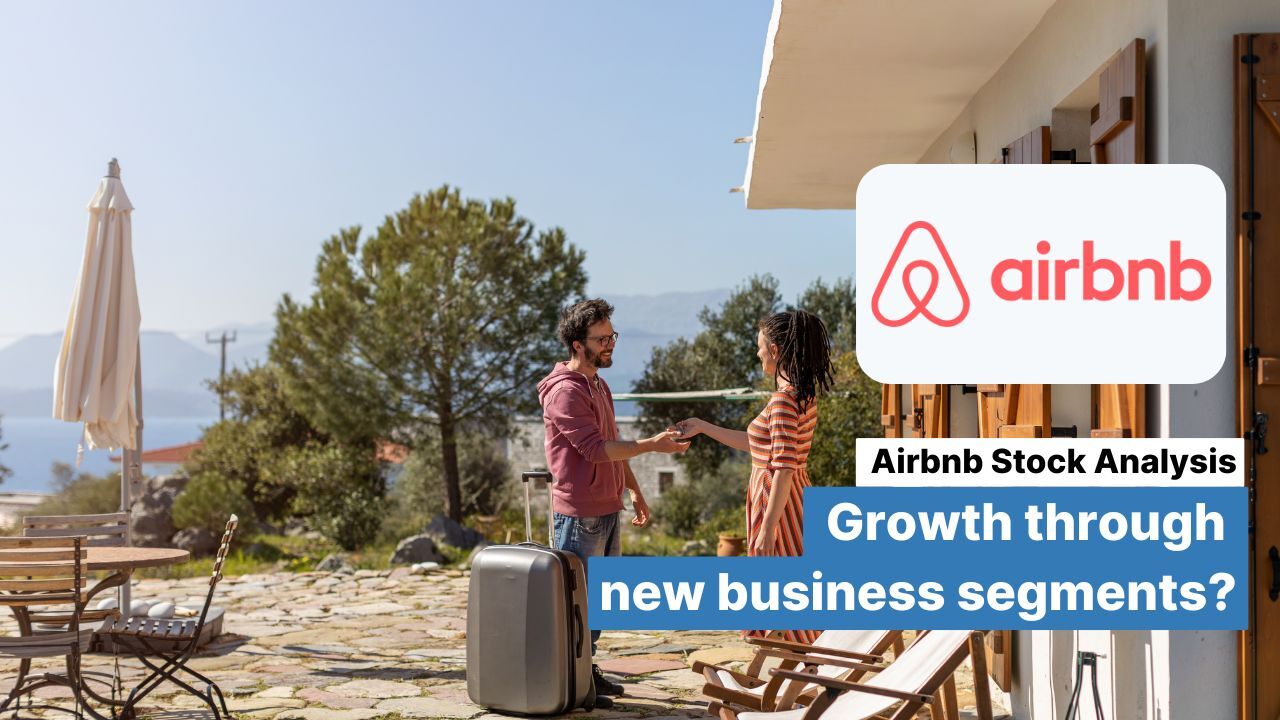Table of Contents
- First things first: What does Airbnb do?
- Fundamental development in Q1 2025
- Valuation compared to competitors
- Airbnb forecast for 2025
- My conclusion: Airbnb remains exciting
- 5 things you need to know about Airbnb right now
In the hype-filled year of 2020, Airbnb stock (ISIN: US0090661010) was the star among newcomers to the stock market. The platform model was seen as the answer to a new, more digital world of travel, in which traditional hotels would be left behind. But enthusiasm was quickly dampened by reality: high expectations, a global pandemic and wildly fluctuating growth rates led to a bumpy ride for the stock. Today, almost five years later, Airbnb has stabilized its operations, is in excellent financial shape – and plans to make announcements on May 13 that will make Airbnb more than just a “platform for staying overnight.”
Is it worth taking a look at the stock before these announcements, or is it better to wait and see? This stock analysis provides the most important facts, developments, and prospects for Airbnb, with a particular focus on the latest Q1 2025 figures and the upcoming announcements.
Further down in the analysis, you will also find a summary of the five most important facts you need to know about Airbnb right now. Stay tuned!
💡 In a nutshell
- Airbnb is the world´s largest marketplace for private accommodations, with over 5 million hosts in 220 countries
- The company generates impressive free cash flows, most recently USD 1.8 billion with a margin of 78% in Q1 2025
- Strategy change is imminent: On May 13, Airbnb plans to expand its offering beyond pure accommodation brokerage
- Despite strong profitability, revenue growth is flattening - a key challenge for the coming years
- Valuation is cheaper than ever - Airbnb is trading at an EV/sales ratio of 6 and an EV/FCF ratio of - 15
First things first: What does Airbnb do?
Airbnb was founded in San Francisco in 2007 when the two founders decided to rent out their apartment to trade fair visitors – complete with air mattresses in the living room. What began as a creative temporary solution has developed into one of the biggest players in the global travel market. Today, Airbnb is represented in over 220 countries and regions and has over 5 million active hosts.
The company no longer sees itself as just a holiday rental agent. Instead, Airbnb is building an entire ecosystem around travel – from accommodation and experiences to community features. The key point is that Airbnb does not own any properties. Instead, the platform efficiently brings together supply and demand – digitally, data-driven and therefore globally scalable.
This asset-light approach makes the business model extremely capital-efficient. Airbnb benefits from classic network effects: the more guests, the more attractive the platform becomes for hosts. And the more hosts with high-quality listings, the more attractive Airbnb becomes for travelers. The result is a self-reinforcing dynamic similar to that seen with platform giants such as Uber and Amazon.
Source: Airbnb stock price
This model has proven particularly successful in times of weaker consumer demand and rising costs. Airbnb can respond flexibly to fluctuations in demand without having to adjust large fixed cost structures—a real advantage over traditional hotel chains.
VINCI generates a significant portion of its long-term stable income in the concessions segment. The company plans, finances, builds, and operates infrastructure projects such as motorways, airports, bridges, tunnels, and car parks on the basis of long-term concession contracts, i.e., for third parties such as the state or large companies. These contracts enable usage fees to be collected over periods of several decades, for example in the form of tolls or airport charges. VINCI is particularly strong in Europe, Latin America, and Asia. High predictability and strong cash flows are characteristic features. In 2024, total revenue of €11.7 billion was generated here, 6.6 percent more than in the previous year. Measured against total revenue of €71.6 billion, this corresponds to a revenue share of 16.3 percent. The main sources of revenue are motorways and airports, which account for 95 percent of segment revenue.
A little stock market history on Airbnb
Airbnb's IPO in December 2020 was celebrated with great euphoria. On its first day of trading, the stock shot up from $68 to over $144 – an increase of over 110% – corresponding to a market capitalization of around $100 billion. Airbnb's valuation was extremely high at the time: the company was valued at 23 times EV/sales (explained here), peaking at 36 times. With hindsight, we are wiser: this valuation was clearly excessive given the company's low profitability and uncertain outlook due to the pandemic.
In the years that followed, Airbnb did see strong operational growth: revenue and free cash flow have exploded, with FCF most recently exceeding $4.5 billion. However, despite this impressive progress, the stock price is currently around 40% below its all-time high. The exaggerated expectations at the time of the IPO have not been fulfilled – the stock price performance remains sobering, especially for investors who bought in at the IPO or shortly thereafter.
Source: StocksGuide underwater chart
Airbnb is now valued at only around 6 times EV/sales – cheaper than ever before. Combined with strong cash flow development and upcoming strategic expansion, this could be an attractive entry point for long-term investors. But more on that later...
Airbnb continues to evolve
According to CEO Brian Chesky, Airbnb is on the verge of a strategic shift: starting in May 2025, the company will move well beyond accommodation booking. No specific new formats have been announced yet, but the company is talking about significantly expanding its range of experiences and integrating them more centrally into the app. The aim is not only to enable travel, but to provide comprehensive support from inspiration to booking to execution. Formats such as retreats, cooking classes, guided tours, or events are conceivable, but Airbnb is deliberately vague on this point so far.
This is not new territory – but until now, the Experiences section has been more of an add-on. Airbnb will release more information on May 13 under the slogan “Big Day. Big News.”
Fundamental development in Q1 2025
In the first quarter of 2025, Airbnb recorded over 143 million booked nights and experiences. This represents an increase of 8% year-on-year. Particularly positive: 58% of bookings were made via the app (previous year: 54%) – a sign of increasing user loyalty. App bookings are particularly attractive for Airbnb. They reduce acquisition costs, increase the conversion rate and strengthen control over the customer journey. Airbnb also benefits from better cross-selling opportunities once experiences are fully integrated.
Gross booking volume (GBV) rose to USD 24.5 billion. GBV is the total payment volume processed through Airbnb. Airbnb's revenue is then calculated from the “take rate,” which currently stands at 9.3%. Airbnb retains this percentage on average from each payment.
Source: financial data from Airbnb
This results in revenue of USD 2.3 billion for Q1 2025, an increase of 6% year-on-year. Adjusted for calendar and currency effects, growth was even higher at 11%. Profit fell to USD 154 million, down from USD 264 million in the previous year. The main drivers are higher costs for employee benefits and investments in product development.
The first quarter was relatively weak in terms of margins, especially in Airbnb's historical context. The net margin was 7%, and the EBITDA margin was 18%. Although these figures are solid compared to the industry average, Airbnb has achieved significantly higher margins in the past.
Free cash flow at top level
Free cash flow stands at USD 1.781 billion. The free cash flow margin for the first quarter is therefore an outstanding 78%. Airbnb is proving to be an impressive cash machine here. TTM (trailing 12 months), the cash flow margin is just under 39% – but remains excellent.
Source: Free cashflow evolution
In addition, stocks worth USD 807 million were repurchased during the quarter. Over the year as a whole, Airbnb invested over USD 3.5 billion in its own stocks, reducing the number of outstanding stocks by just under 6%. The following chart shows how Airbnb has continuously reduced the number of outstanding stocks since the end of 2023.
Source: Evolution of outstanding shares
These stocks buybacks underscore both Airbnb's financial strength and management's confidence in the stock. At the same time, the balance sheet remains strong, with $11.5 billion in cash and cash equivalents and only $2 billion in short-term debt.
Weak revenue growth: the fly in the ointment
As convincing as Airbnb's platform model, cash flow strength, and strategic ambitions are, one issue is still causing investors headaches: revenue growth. The pace of growth has been slowing noticeably for several years, which was once again evident in the latest Q1 figures. Although adjusted revenue growth is a respectable 11%, a clear downward trend is evident when comparing figures over several years.
Source: Revenue growth Airbnb
This is precisely where management intends to pick up the baton with its “big news” on May 13. New business areas are expected to put revenue growth back on track.
Airbnb as a high-growth investing topscorer
Airbnb's high-growth investing analysis paints a very convincing picture, despite a few minor weaknesses. With a current HGI score of 13 points, the stock is among the top performers in the rankings. A score of 11 points or higher is considered a top performer.
Source: Airbnb is a HGI to-scorer with a score of 13
The valuation stands out particularly positively: with an EV/sales ratio of 6.06, Airbnb achieves full marks (3/3) in this category – a level that has been rare for the company in the past and is considered attractive in view of its cash flow. Debt is also very moderate with a low debt/equity ratio, scoring 3 out of 3 points here as well. The same applies to the PEG ratio, which underscores the favorable relationship between earnings growth and valuation.
Although Airbnb's gross margin of 71.5% is below the top values for typical software companies, it still scores 2 out of 3 possible points.
As already mentioned, revenue growth remains critical. With TTM growth of less than 10%, the company scores 0 points in this category, which also has a negative impact on the Rule of 40 score. At 48.5%, this is above the threshold of 40%, but not high enough for the maximum score. Accordingly, only 2 out of 3 points are awarded here.
The bottom line is that the HGI analysis also shows that Airbnb impresses with strong profitability and an attractive valuation – key elements for growth-oriented investors with an eye on risk and return. Those who believe that Airbnb will regain its growth momentum from May onwards with its announced strategy are likely to see the current stock price as an interesting entry point.
Valuation compared to competitors
Although Airbnb is often perceived as expensive on the stock market, its valuation is put into perspective when looking at the current key figures. With an EV/FCF of around 15, Airbnb is currently significantly cheaper than Booking (approx. 20) and is thus at its most attractive valuation level since its IPO. By way of comparison, the multiple was still above 30 at the time of the IPO.
Source: Airbnb vs. Booking EV/FCF
This more moderate assessment applies to a company with strong free cash flow, robust margins, and a growing strategic vision. Airbnb combines an easily scalable business model with high capital discipline.
Source: EV/Sales Airbnb vs. Booking
Airbnb also looks attractive in terms of revenue. For a long time, the stock was valued significantly higher than Booking.com. Now, the EV/sales ratio stands at 6.1, below the valuation of Booking.com at 7. This means that Airbnb is currently valued more favorably than the other travel platform in terms of cash flow and revenue.
Airbnb forecast for 2025
A look at analyst estimates shows that many still expect rather subdued revenue growth of around 8.5% for 2025 – a figure that is significantly below Airbnb's previous growth rates. Analysts do not expect momentum to pick up again until 2026, with double-digit annual growth rates until 2028. Analysts currently do not consider a return to growth rates significantly above 10% to be realistic.
Source: Revenue estimates Airbnb
This cautious stance is also reflected in the target price: the average for 2026 is USD 138.39, which corresponds to upside potential of around +10.8%.
Source: Airbnb target price 2025
The expectation: 2025 will remain a transition year. If the new strategic direction takes effect in May, this should also be reflected in future estimates and stock price performance.
My conclusion: Airbnb remains exciting
Airbnb is currently valued more favorably than ever before and is strategically well positioned. The combination of strong free cash flow, growing app usage, and plans to expand beyond the accommodation business opens up long-term potential in my view. However, the decisive factor will be whether management succeeds in establishing new sources of revenue and thus reviving the recently flattening revenue growth.
Personally, I think the chances of this happening are very good: since its founding in 2007, Airbnb has managed to build a leading global platform that is digital, efficient, and has impressive brand strength. And I can say for myself that when I book, I clearly prefer Airbnb over Booking.com. I find booking a trip through Airbnb much more pleasant and modern, and I have greater confidence in the quality of the platforms listed on Airbnb than on Booking.com. As soon as I'm looking for accommodation for a group of friends of more than three people, I wouldn't even open Booking.com at this point; I would always choose Airbnb for my search.
Another thing that should not be forgotten is that in its nearly fifteen years of existence, Airbnb has hardly expanded into business areas that Booking has long since exhausted – be it transportation, package tours, or insurance. This shows how much “white space” still exists for future revenue streams.
The vision is clear: Airbnb no longer wants to be just an accommodation provider, but wants to transform itself into a holistic experience platform. It has a modern, user-friendly app, a global user base, and a solid financial foundation. Of course, there are still risks: political intervention, new regulations, growing competition from hotels and other platforms. But Airbnb has repeatedly demonstrated the flexibility and resilience of its model in the past – whether during the pandemic, rising interest rates, or economic uncertainty.
If you believe in platform models, value brand strength, and see the digital transformation of the travel market as just beginning rather than complete, Airbnb is a highly exciting stock. Personally, I am very excited about the innovations announced for May 13, 2025.
If you would like to follow Airbnb, set up a watchlist in StocksGuide, add the Airbnb stock, and activate our Morning Briefing. That way, you'll be the first to hear about news related to the company's business development!
5 things you need to know about Airbnb right now
1.Strong free cash flow: In Q1 2025, Airbnb generated FCF of $1.8 billion – with an outstanding margin of 78%. TTM FCF is over $4.4 billion with a margin of 39%.
2.Valuation cheaper than ever: With an EV/FCF of ~15 and an EV/sales ratio of ~6, Airbnb is currently cheaper than Booking.
3.Revenue growth is flattening: Despite +11% adjusted revenue growth, the multi-year trend is pointing downwards – a risk, but also an opportunity.
4.Strategy change on the horizon: On May 13, Airbnb will unveil new products to grow beyond the pure accommodation business.
5.Financially strong: USD 11.5 billion in cash, stock buybacks in the billions, and high free cash flows provide scope for expansion.
🔔 If you would like to receive new investment ideas and free stock analyses selected according to the Levermann, High-Growth Investing or Dividend strategies by email every week, you can now subscribe to our free StocksGuide newsletter.
The author and/or persons or companies associated with the StocksGuide own or may own stocks in Airbnb.
This post represents an expression of opinion and not investment advice. Please note the legal information.




